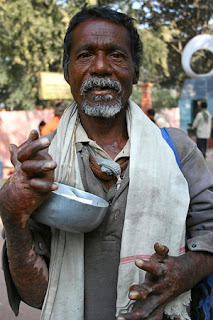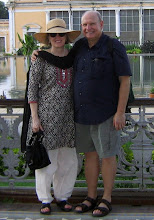 “In developing countries, the root causes of food insecurity include: poverty, war and civil conflict, corruption, national policies that do not promote equal access to food for all, environmental degradation, barriers to trade, insufficient agricultural development, population growth, low levels of education, social and gender inequality, poor health status, cultural insensitivity, and natural disasters. In the United States, the primary cause of food insecurity is poverty. Low levels of education, poor health status, and certain disabilities also increase the risk of food insecurity for individuals and households in the United States. (The photo of the row of houses is from the Brightmoor neighborhood in Detroit said to be one of the poorest in the US. )
“In developing countries, the root causes of food insecurity include: poverty, war and civil conflict, corruption, national policies that do not promote equal access to food for all, environmental degradation, barriers to trade, insufficient agricultural development, population growth, low levels of education, social and gender inequality, poor health status, cultural insensitivity, and natural disasters. In the United States, the primary cause of food insecurity is poverty. Low levels of education, poor health status, and certain disabilities also increase the risk of food insecurity for individuals and households in the United States. (The photo of the row of houses is from the Brightmoor neighborhood in Detroit said to be one of the poorest in the US. )
Globally, certain groups of people are more vulnerable to food insecurity than others. Vulnerable groups include: victims of conflict (e.g., refugees and internally displaced people); migrant workers; marginal populations (e.g., school dropouts, unemployed people, homeless people, and orphans); dependent populations (e.g., elderly people,
 children under five, and disabled and ill people); women of reproductive age; ethnic minorities; and low literacy households.”
children under five, and disabled and ill people); women of reproductive age; ethnic minorities; and low literacy households.”There are over 1000 papers, articles, and other documents on the USDA website on Food Security/Insecurity. People get their degrees, go to conferences like the one picture of the women at the UN reporting on poverty, write papers, and get grants but the problems are chronic.
 I find it ironic that my apartment is surrounded by tarp/tent villages of laborer families. We are in the MLA (members of the legislative assembly) which runs the city.
I find it ironic that my apartment is surrounded by tarp/tent villages of laborer families. We are in the MLA (members of the legislative assembly) which runs the city.  A recent report says that half of the world’s hungry live in India. We’re in one of the high tech centers of the country. The homily at mass every Sunday is about taking care of the poor. Yet the scene doesn’t perceptibly change.
A recent report says that half of the world’s hungry live in India. We’re in one of the high tech centers of the country. The homily at mass every Sunday is about taking care of the poor. Yet the scene doesn’t perceptibly change.What we take as knowledge is strictly observation such as the descriptions of food insecurity above.
 We can describe it, we can call meetings, but we, particularly in the West, can’t fathom the issue. It’s like a discussion I recently had with our daughter when she read about the deplorable conditions of the athlete housing for the Commonwealth Games. While it was a light discussion, there were some issues that Leigh just couldn’t believe. One was how the construction companies that built the venues for the games could skirt the child labor laws.
We can describe it, we can call meetings, but we, particularly in the West, can’t fathom the issue. It’s like a discussion I recently had with our daughter when she read about the deplorable conditions of the athlete housing for the Commonwealth Games. While it was a light discussion, there were some issues that Leigh just couldn’t believe. One was how the construction companies that built the venues for the games could skirt the child labor laws. Well, all the stakeholders: government, contractors, and the laborer families all are complicit in the circumvention. In the last post, I discussed how families from the area around the government schools have to make a choice: send the kid to school where they get clothing and a meal (thus less out-of-pocket [if one had a pocket] costs) versus having the child work or beg would bring in more revenue. And in a sense, that is the level of decision-making with which the folks that write the papers, give presentations, work on dissertations have no empathy.
Well, all the stakeholders: government, contractors, and the laborer families all are complicit in the circumvention. In the last post, I discussed how families from the area around the government schools have to make a choice: send the kid to school where they get clothing and a meal (thus less out-of-pocket [if one had a pocket] costs) versus having the child work or beg would bring in more revenue. And in a sense, that is the level of decision-making with which the folks that write the papers, give presentations, work on dissertations have no empathy.  They may have good intentions, but most lack the ability to bridge the thought gap.
They may have good intentions, but most lack the ability to bridge the thought gap.If you read my cathartic post a few days back, I related how our experiment with domestic help came to an unpleasant end for all parties. But it serves as an example of my inability to (1) understand the inertia under which decision choices are made and (2) to tolerate the consequences of decisions that are made due to that inertia. As we prepared to move into our apartment about two months back, I was tasked with set up and logistics.
 This brought me to Big Bazaar and a more in-depth relation with Hypercity as I bought what I considered the essentials for maintaining the apartment. We’re talkin’ real basics: cleaning items including mop, buckets (they were on a two-for-one special at Big Bazaar), cleaning products with brand names such as Lizol, the branded ripoff of Lysol. On the first day of work the domestic, Madavi, complained to our former buddy Buchi Babu that she didn’t like the mop we had purchased. It was a synthetic fiber.
This brought me to Big Bazaar and a more in-depth relation with Hypercity as I bought what I considered the essentials for maintaining the apartment. We’re talkin’ real basics: cleaning items including mop, buckets (they were on a two-for-one special at Big Bazaar), cleaning products with brand names such as Lizol, the branded ripoff of Lysol. On the first day of work the domestic, Madavi, complained to our former buddy Buchi Babu that she didn’t like the mop we had purchased. It was a synthetic fiber. She strongly preferred a traditional cotton mop. Besides the fact that the new mop could be wrung out utilizing the mechanism on the handle, the fibers also picked up and held more material (read dirt) than the traditional cotton mop you have to hand wring out, and on and on. Anyway, what I realize in retrospect is that Madavi cleaned the way she knew how and didn’t want to deal with the new technologies including my microfiber dust mop for which she preferred the brooms you see sweeping the streets.
She strongly preferred a traditional cotton mop. Besides the fact that the new mop could be wrung out utilizing the mechanism on the handle, the fibers also picked up and held more material (read dirt) than the traditional cotton mop you have to hand wring out, and on and on. Anyway, what I realize in retrospect is that Madavi cleaned the way she knew how and didn’t want to deal with the new technologies including my microfiber dust mop for which she preferred the brooms you see sweeping the streets.  The inability for us to resolve these differences, the consequences of which I contend are that MY way leads to a cleaner apartment, just could not be reconciled.
The inability for us to resolve these differences, the consequences of which I contend are that MY way leads to a cleaner apartment, just could not be reconciled.While my example is trivial, it points to the grander issue that if we can’t reconcile the mop differences, how can we possibly reconcile the larger issues? Well, the answers are home grown efforts, not the extortionist efforts of the UN to global transference of wealth as the whining, pantie-waist, hand-wringing reports of how far off the mark for the 2015 eradication of global poverty were center stage at last week’s general assembly.
Home grown is key. Most of you know that micro-financing first showed success in Bangladesh. Mohamed Yunus, now burdened by being a Nobel Peace Prize winner, started the practice from his bank he started with $27 USD in 1974. Now he has 6.6 million borrowers, mostly women. Mr. Yunus is a worldwide example of how entrepreneurship works for the poor.
 I’ve already related how there are efforts here in India to do the same and, of course, do it better than someone from, tisk, Bangladesh. Now, I’m proposing to my acquaintance, the Hyderabad homey now teaching at Bowling Green State University, that we look at what types of support are required to increase the likelihood of any one loan holder to succeed.
I’ve already related how there are efforts here in India to do the same and, of course, do it better than someone from, tisk, Bangladesh. Now, I’m proposing to my acquaintance, the Hyderabad homey now teaching at Bowling Green State University, that we look at what types of support are required to increase the likelihood of any one loan holder to succeed.During a Skype conversation, our son, David, suggested that no more studies need to be conducted. His analysis: micro-financing works. However, I explained that Professor Gajjala needed to publish an article, so David begrudgingly relented as a favor. But David also points out that the interest that the micro-financed loans charge would make Chili Palmer proud and David did use “loan sharking” as a substitute for micro-financing. But David has that Jesuit tendency to cut through the clutter, much like his Mother.
You see pockets of these entrepreneurial activities throughout Asia and even some in Africa (which is the only ray of hope I see there). Small projects that help individuals, for which the initial monetary investment is very small, do not pique the interest of local government officials. I intentionally did not put corrupt as an adjective with local government officials as it would be redundant.
The long and short is, the US “poor” are not “world poor.” You have choices in the US. You have resources in both the public and private sectors. You can choose to be uneducated which is a key contributor to poverty which is a key contributor to food insecurity. You can choose to live on the streets. But in the US, you are never in a deprived state, at least for the long term unless you want to be. Here in India, you can be in a deprived state for generations, and in some areas, for millennia.
Here I’ve experienced a rudimentary system that tries to provide some level of education from the public sector and now some opportunities from the private sector. This gives people the opportunity to choose from some alternatives. What I have also seen is that a great deal of people choose to do something, even if it is an untouchable family living in and working daily in the “recycle” centers spread throughout Hyderabad.
The problem is one which I noted long ago for which evidence continues to pop up as we visit the various sites around the city. I will talk more about that in my post about Golconda and Chowmahalla Palace.


PTYL



















































